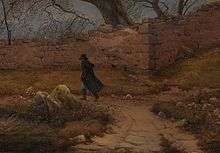Wandrers Sturmlied
| Wandrers Sturmlied | |
|---|---|
| Choral work by Richard Strauss | |
 Wanderer in the storm, painting by Julius von Leypold, 1835 | |
| English | Wanderer's storm song. |
| Key | D Minor, D Major. |
| Catalogue | Opus 14, TrV 131. |
| Text | Johann Wolfgang von Goethe |
| Language | German |
| Composed | 1884 |
| Dedication | Dr Franz Wüllner. |
| Scoring | Mixed choir SSATBB and orchestra. |
The Wanderer's Storm Song (German: Wandrers Sturmlied), Opus 14, TrV 131 is a choral work for choir and orchestra written by Richard Strauss in 1884, based on a poem by Johann Wolfgang von Goethe of the same title.
Composition history
The piece was written when Strauss had come under the influence of the music of Johannes Brahms. Completed, May 22, 1884.[1] The work was premiered with Strauss conducting at Cologne on March 8, 1887, with the city orchestra and choir. The choir is divided into six parts: two soprano, alto, tenor and two bass. The work is dedicated to Franz Wullner who had conducted the German premier of Strauss' Symphony 2 in January 1885.
Orchestra
The orchestral arrangement calls for:
- One piccolo, Two flutes, two oboes, two clarinets in B, two bassoons, one contrabassoon.
- Four french horns in F, two trumpets in D, three trombones.
- Timpani
- Strings
Lyrics

Strauss sets the first 38 lines of Goethe's 116 line poem.
| Wandrers Sturmlied | The Wanderer's Storm Song[2] |
|---|---|
Wen du nicht verlässest, Genius, |
He whom thou ne'er leavest, Genius, |
References
Notes
- ↑ Trenner, page 37.
- ↑ Translation Read Books Online.
Sources
- Norman Del Mar, Richard Strauss. A Critical Commentary on his Life and Works, Volume 3, London: Faber and Faber (2009)[1968] (second edition), ISBN 978-0-571-25098-1.
- Schuh, Willi. Richard Strauss: A Chronicle of the Early Years 1864-1898, (translated by Mary Wittal), Cambridge University Press, 1982. ISBN 9780521241045.
- Trenner, Franz. Richard Strauss Chronik, Verlag Dr Richard Strauss Gmbh, Wien, 2003. ISBN 3-901974-01-6